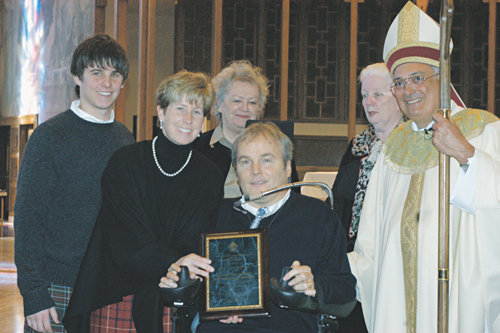
By Father Michael Panicali
The most profound example of forgiveness that many of us New Yorkers had the chance to witness up close and personal has to be that of the late NYPD Detective Steven McDonald forgiving the teenager who in 1986 shot him in Central Park and left him paralyzed from the neck down.
At his passing just over two years ago, he was remembered as a heroic, courageous and principled man who chose to use his suffering as a spiritual journey toward holiness, rather than as a motivation for self-pity and spite. Det. McDonald not only forgave from his heart and hoped for the good of his shooter, but also became an international ambassador of peace and forgiveness, journeying and working for reconciliation in Bosnia, Northern Ireland and Israel.
Though he came to know world leaders, including Pope St. John Paul II and Nelson Mandela, Det. McDonald serves as an everyman example of the power of the human will to choose forgiveness over animosity and bitterness.
His “road on this earth was not easy, but he showed us what we need to know,” Mayor Bill de Blasio shared at McDonald’s funeral Mass, echoed by Police Commissioner James O’Neill, who offered, “What we can learn from Steven’s life is this: The cycle of violence that plagues so many lives today can be overcome only by breaking down the walls that separate people. The best tools for doing this, Steven taught us, are love, respect and forgiveness.”
A man who both understood and lived Christ Crucified, Det. McDonald’s show of forgiveness indicates his positive response to Christ’s pleas to the Father on the Cross, for mercy and pardon toward His tormentors. Indeed, Christ’s very actions on the cross answered and broke thecycle of violence that doomed us with the defeat of sin and death by Love Itself.
And now, today, the work is ours to do. This is resoundingly clear.
Relevant to today’s Gospel, and sadly lost upon a world wherein vindictiveness and revenge are many times encouraged and celebrated, Christ teaches us – the importance of which cannot be overstated – that our showing forgiveness toward others is integral and essential in attaining our own eternal salvation.
“Forgive and you will be forgiven,” Christ instructs us in today’s account from Luke.
“Give and gifts will be given to you; a good measure, packed together, shaken down, and overflowing, will be poured into your lap. For the measure with which you measure will in return be measured out to you.”
Echoing the words of the “Our Father” to ask God for our own forgiveness while at the same time, we forgive those who trespass against us, Christ makes it clear that these two actions are not exclusive of each other. One cannot be separated from the other.
We often convince ourselves that there are things that cannot be forgiven. We fall victim to the thinking that it is a natural human response to being hurt to want those who have hurt us, to be hurt themselves. While it is natural to seek justice, the sense of which is embedded in our hearts and souls by our Creator, retaliatory human justice of this sort is misguided and harmful.
Christ makes it clear that hate, retaliation and withholding forgiveness are not good for us, and will not advance our salvation. He makes this clear nowhere more beautifully than on the cross. With Christ as his model, Det. McDonald knew that forgiving his shooter would ultimately be good for the young man, and good for him to do the forgiving – an inspiring example of the power of the human will in doing all things in Christ who strengthens.
Father Panicali is a parochial vicar at St. Mark and St. Margaret Mary parish, Sheepshead Bay.
